2015届中考语法名师讲练【第3讲】代词
文档属性
| 名称 | 2015届中考语法名师讲练【第3讲】代词 | 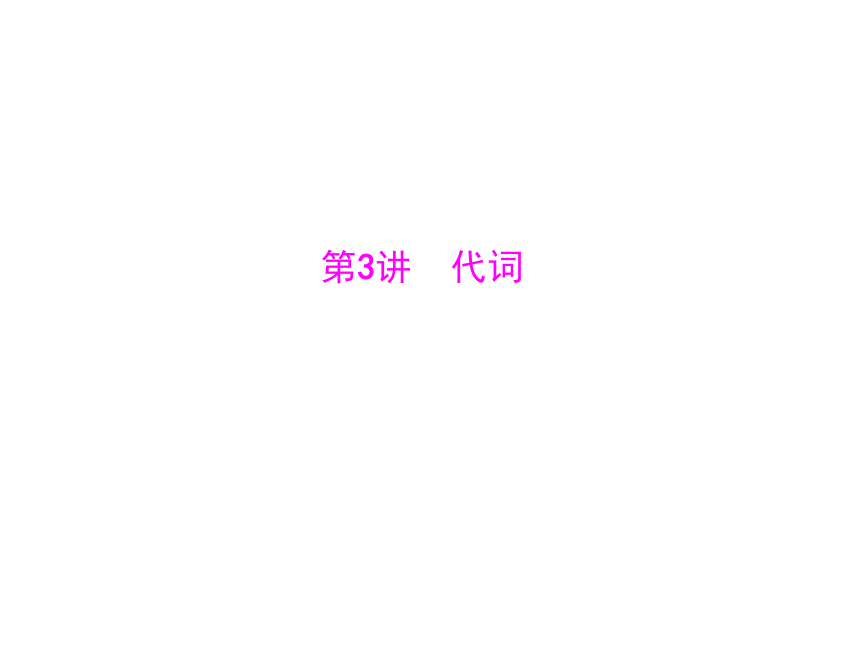 | |
| 格式 | zip | ||
| 文件大小 | 230.9KB | ||
| 资源类型 | 教案 | ||
| 版本资源 | 通用版 | ||
| 科目 | 英语 | ||
| 更新时间 | 2014-08-06 13:16:16 | ||
图片预览

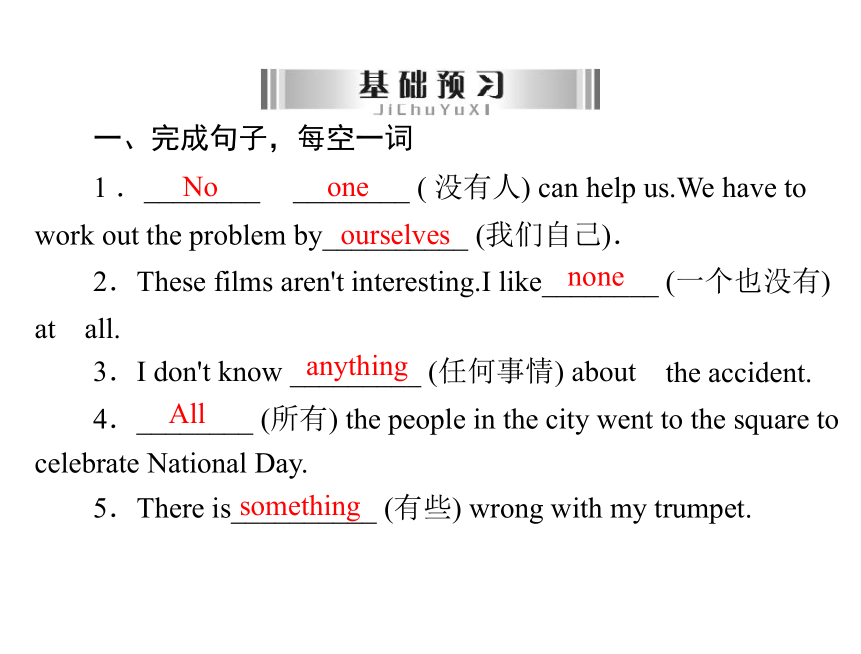
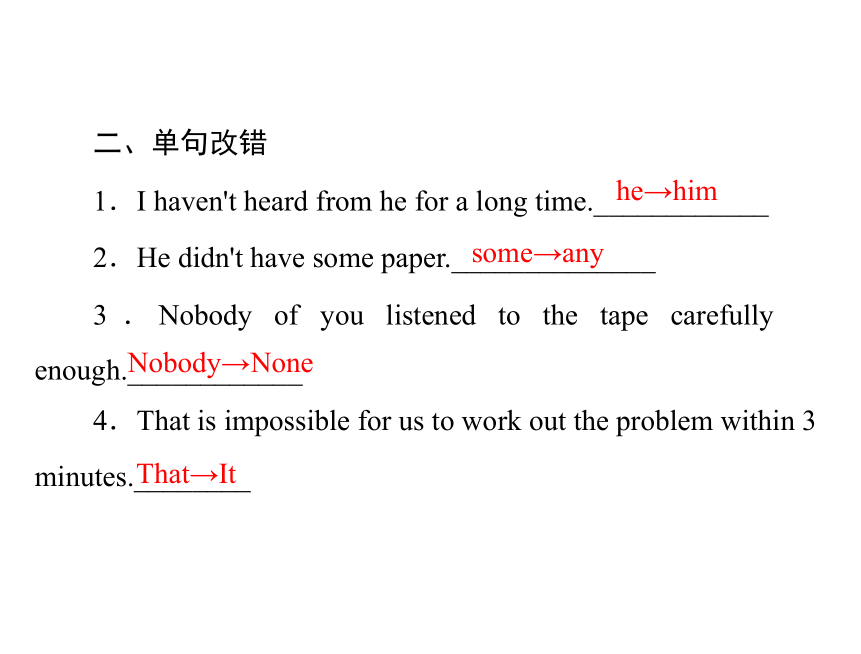
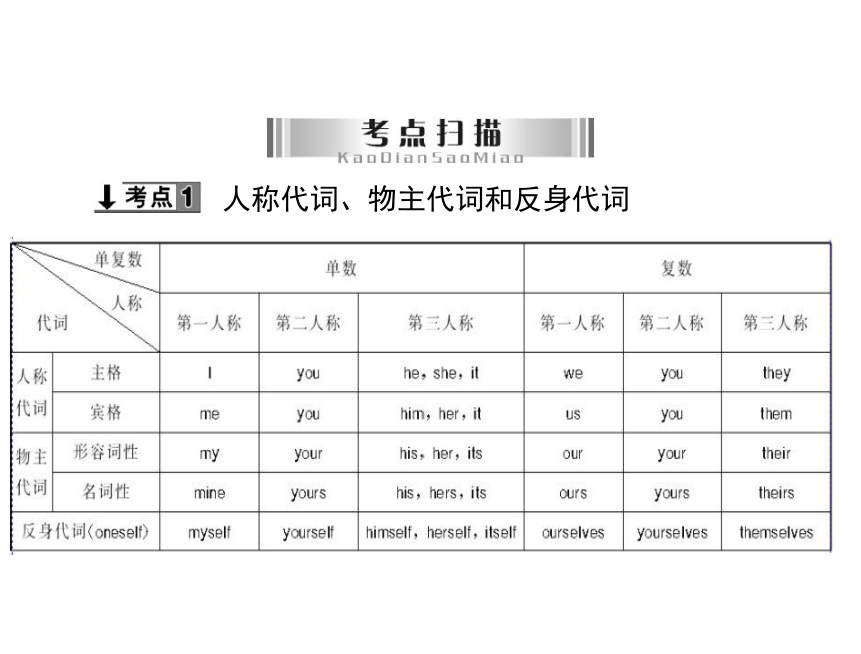
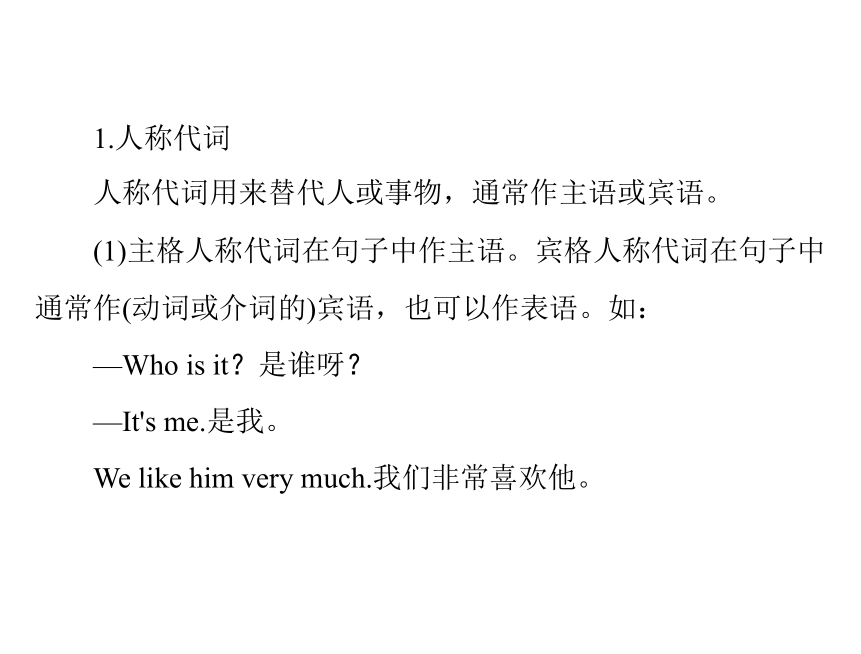
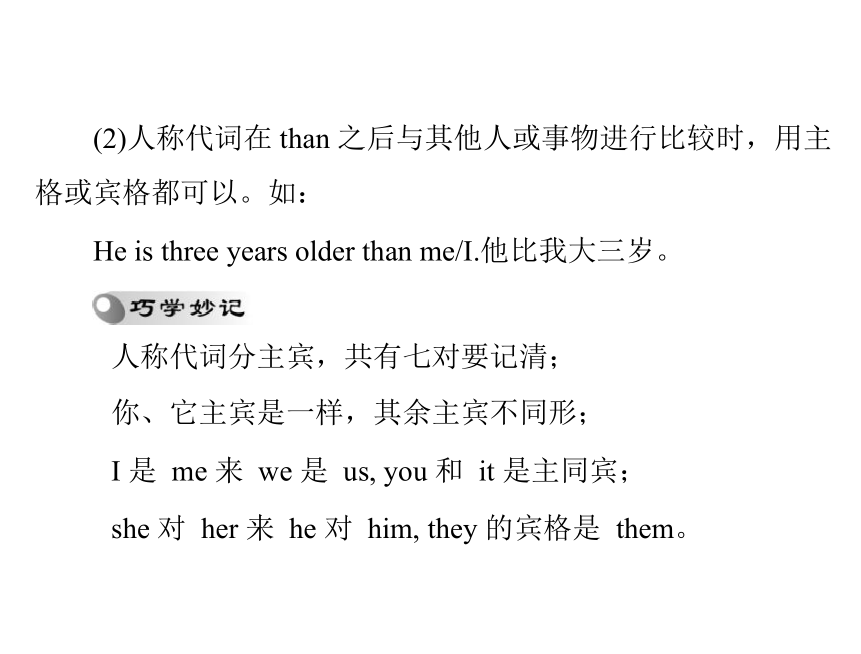
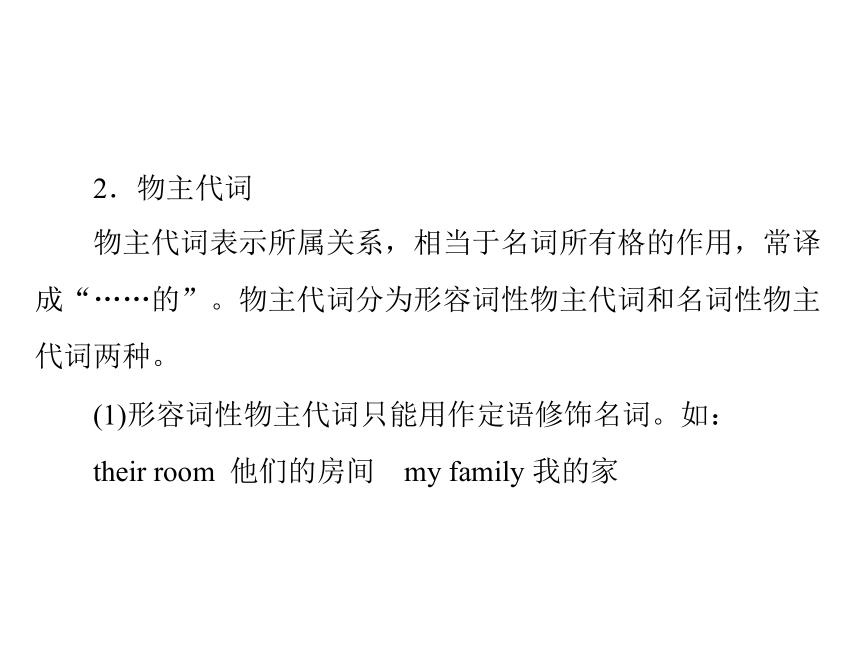
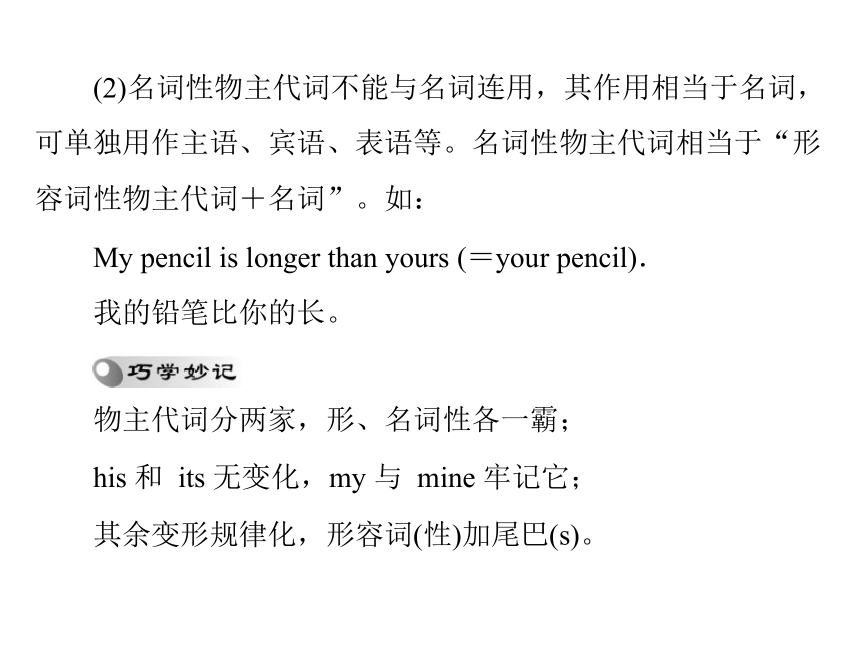
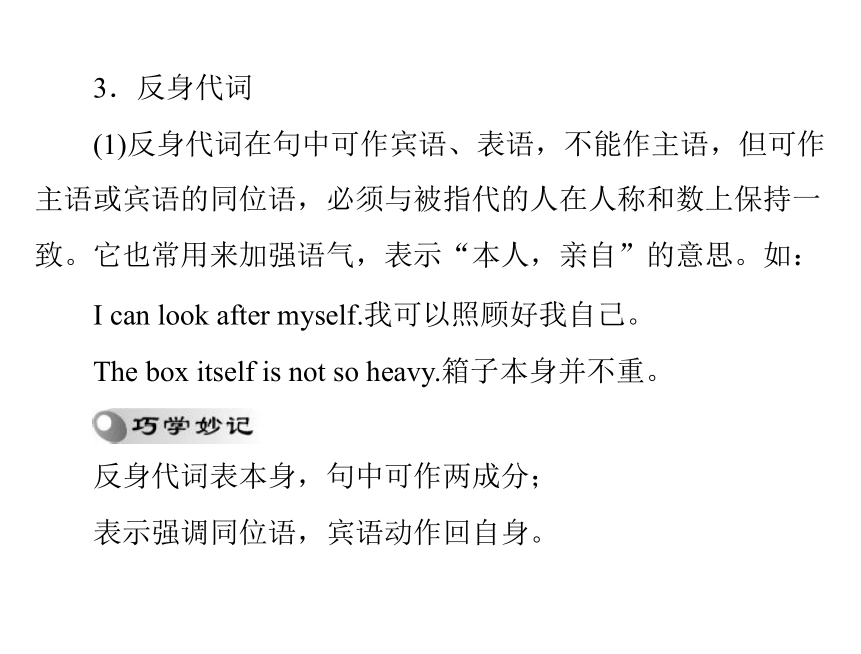
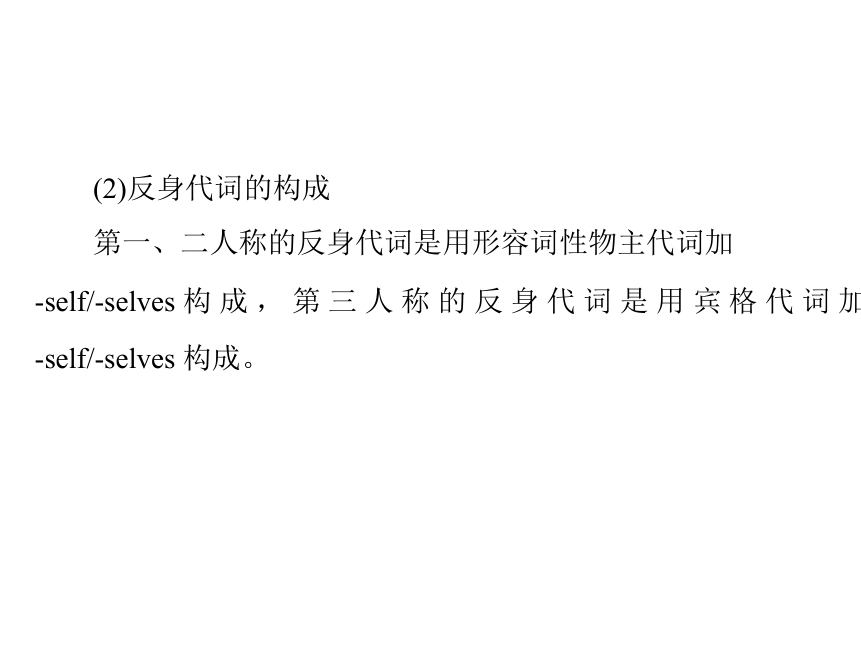
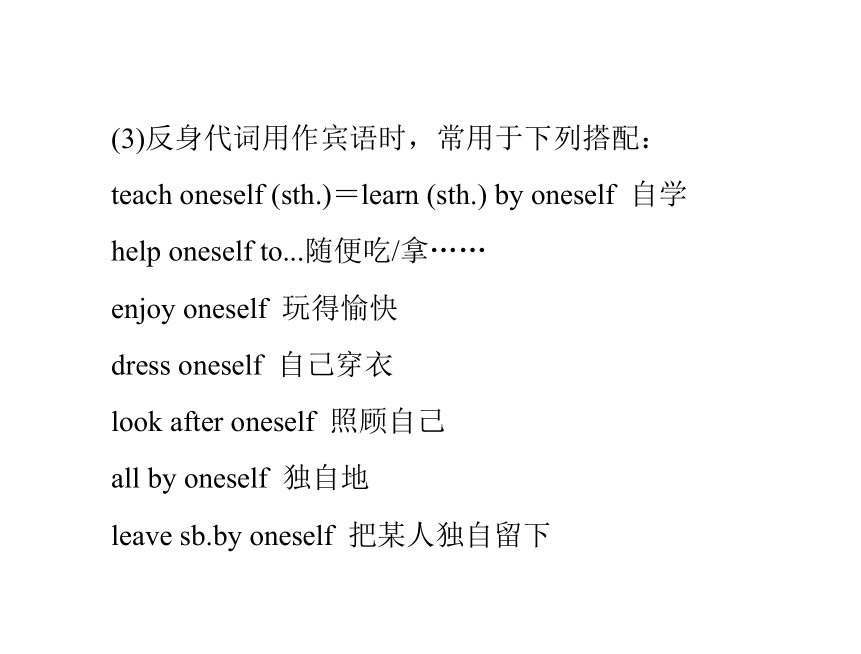
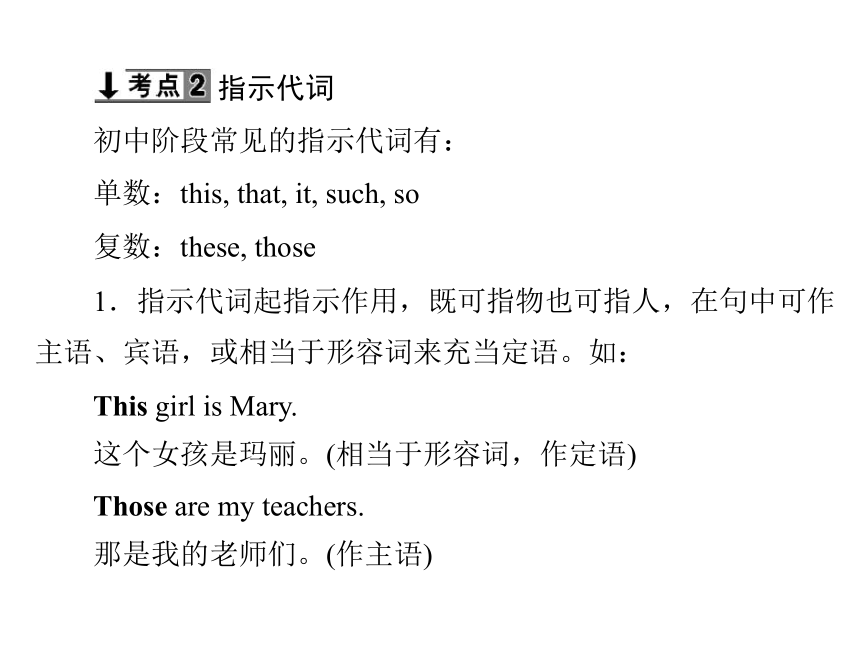
文档简介
课件52张PPT。第3讲代词一、完成句子,每空一词Nooneourselvesnone1 .________________ ( 没有人) can help us.We have towork out the problem by__________ (我们自己).
2.These films aren't interesting.I like________ (一个也没有)atall.anythingAll3.I don't know _________ (任何事情) aboutthe accident. 4.________ (所有) the people in the city went to the square to
celebrate National Day.
5.There is__________ (有些) wrong with my trumpet.
somethinghe→himsome→anyNobody→None 二、单句改错
1.I haven't heard from he for a long time.____________
2.He didn't have some paper.______________
3 . Nobody of you listened to the tape carefully
enough.____________
4.That is impossible for us to work out the problem within 3
minutes.________
That→It人称代词、物主代词和反身代词1.人称代词人称代词用来替代人或事物,通常作主语或宾语。(1)主格人称代词在句子中作主语。宾格人称代词在句子中通常作(动词或介词的)宾语,也可以作表语。如:—Who is it?是谁呀?
—It's me.是我。We like him very much.我们非常喜欢他。(2)人称代词在 than 之后与其他人或事物进行比较时,用主格或宾格都可以。如:He is three years older than me/I.他比我大三岁。人称代词分主宾,共有七对要记清;
你、它主宾是一样,其余主宾不同形;
I 是 me 来 we 是 us, you 和 it 是主同宾;
she 对 her 来 he 对 him, they 的宾格是 them。 2.物主代词
物主代词表示所属关系,相当于名词所有格的作用,常译
成“……的”。物主代词分为形容词性物主代词和名词性物主
代词两种。
(1)形容词性物主代词只能用作定语修饰名词。如:their room 他们的房间my family 我的家 (2)名词性物主代词不能与名词连用,其作用相当于名词,
可单独用作主语、宾语、表语等。名词性物主代词相当于“形
容词性物主代词+名词”。如:My pencil is longer than yours (=your pencil).
我的铅笔比你的长。物主代词分两家,形、名词性各一霸;
his 和 its 无变化,my 与 mine 牢记它;
其余变形规律化,形容词(性)加尾巴(s)。3.反身代词 (1)反身代词在句中可作宾语、表语,不能作主语,但可作
主语或宾语的同位语,必须与被指代的人在人称和数上保持一
致。它也常用来加强语气,表示“本人,亲自”的意思。如:I can look after myself.我可以照顾好我自己。
The box itself is not so heavy.箱子本身并不重。反身代词表本身,句中可作两成分;
表示强调同位语,宾语动作回自身。(2)反身代词的构成 第一、二人称的反身代词是用形容词性物主代词加
-self/-selves 构 成 , 第 三 人 称 的 反 身 代 词 是 用 宾 格 代 词 加
-self/-selves 构成。(3)反身代词用作宾语时,常用于下列搭配:
teach oneself (sth.)=learn (sth.) by oneself 自学
help oneself to...随便吃/拿……
enjoy oneself 玩得愉快
dress oneself 自己穿衣look after oneself 照顾自己
all by oneself 独自地leave sb.by oneself 把某人独自留下指示代词初中阶段常见的指示代词有:
单数:this, that, it, such, so
复数:these, those1.指示代词起指示作用,既可指物也可指人,在句中可作主语、宾语,或相当于形容词来充当定语。如:This girl is Mary.这个女孩是玛丽。(相当于形容词,作定语)Those are my teachers.那是我的老师们。(作主语)2.this 和 these 指在时间或空间上较近的人或事物,也可指代下文将要提到的人或事物。如:This is a pen and that is an eraser.
这是一支钢笔,那是一块橡皮。You needn't do this—it's pretty easy.
你不必做这件事,它相当容易。 3.that 和 those 指在时间或空间上较远的人或事物;也可
指代前面提到的事物,以避免重复,多用于比较级的句子中。
如:The weather in Beijing is different from that in London. 北京的气候与伦敦的(气候)不同。4.打电话时,询问对方或介绍自己的身份,常用 this 指代自己“我”,用 that 指代对方“你”。如:—Hello, who's that?你好,你是哪位?
—This is Jenny speaking.我是珍妮。不定代词不定代词用来代替或修饰任何不定数量及不定范围的人或事物。初中阶段常见的不定代词有:复合不定代词 1.复合不定代词是由 some-, any-, no-, every-加上-one,
-body, -thing 等所组成的不定代词。常见的复合不定代词有: 2.由 some-构成的复合不定代词多用于肯定句、期待得到肯
定回答的疑问句、表示建议或请求的疑问句中;由 any-构成的
复合不定代词多用于否定句、疑问句及条件状语从句中。3.复合不定代词作主语时,谓语动词用单数。4.形容词修饰复合不定代词时,要放在复合不定代词的后面。如:Something strange happened in that village.
那个村庄发生了一些奇怪的事。疑问代词疑问代词在句中可作主语、宾语、定语和表语。it 的用法1.指代上文的内容,代替前面提到过的那个人或物。如:The Olympic Games was held in Beijing in 2008.It made theChinese very proud.2008 年北京举办了奥运会。这使中国人非常自豪。
2.用来代替指示代词 this 或 that。如:
—What's that?那是什么?—It's a dictionary.那是一本字典。3.作人称代词,指代东西、动物、婴儿和未确定身份、性别的人。如:Where's my bag? Have you seen it?
我的包在哪里?你看见没有?The baby cried because it was hungry.这个婴儿哭了,因为他/她饿了。4.表示时间、天气、季节、距离等。如:
What time is it now? 现在几点了?
It is warm.天气很暖和。5.充当形式主语或形式宾语,常用于下列句型中:
It's+形容词(+for/of sb.)+to do sth.
(对某人来说)做某事怎么样It's+形容词+that 从句 做某事怎么样
sb.find/think it+形容词+to do sth.
某人发现/认为做某事怎么样It's time (for sb.) to do sth.是该(某人)做某事的时候了
It seems that...看起来似乎……1.it, one, that, those(1)it 指代前面提到过的那个人或物。 (2)one 表示泛指,指前面提到的那类人或物中的“任何
一个”,用来代替单数可数名词,其复数形式是 ones。
(3)that 指代同一类别中的“另一个”,用来代替单数可数名词或不可数名词。(4)those 用来代替复数名词,指代同一类别中的“另一些”,通常用于比较级的句子中。oneitthatthose 即景活用
(1)—Your watch is cool!I want to buy ________ like yours.
—I bought ________ two weeks ago.
(2)The weather in Shanwei is hotter than ________ in
Shaoguan.
(3)The buildings of Shanghai are higher than ________ of
Zhongshan.2.a few, few, a little, little(1)a few+可数名词复数,表示肯定意义,意为“一些,几个”。(2)few+可数名词复数,表示否定意义,意为“几乎没有”。(3)a little +不可数名词,表示肯定意义,意为“有一点”;还可修饰形容词,表示程度。(4)little +不可数名词,表示否定意义,意为“几乎没有”。即景活用littlefewa little (1)He really wanted to buy the shoes but he knew his mother
had ________ money.
(2)Today is very cold, so there are ________ people in the
street.
(3)I'm thirsty.Thank goodness!I still have ________ water. (2)all 指三者(或三者以上)“全部,都,所有”,表示肯
定,后接可数名词复数(作主语时谓语动词用复数)和不可数名
词(作主语时谓语动词用单数)。反义词是 none。(3)either 指两者中的“任何一个”,作主语时谓语动词用单数。 3.both, all, either, neither, none
这几个代词后面都可以跟介词 of。
(1)both 指两者“都”,表示肯定,在句中可作主语、宾
语和定语,后接复数名词。反义词是 neither。(4)neither 指两者“都不”,表示否定,作主语时谓语动词用单数。BothEitherNeitherAll 即景活用
(1)He has two uncles.________ of them are doctors.
(2)—Which do you prefer, the red one or the blue one?
—____________ is OK.I don't care.
(3)________ of the twins has been to Guangzhou.They hope
to visit it one day.
(4)I'm a fan of Jay Chou.________ of the songs that he sang
are beautiful.(5)none 指三者(或三者以上)“都不,没有一个”,表示否定。作主语时,谓语动词用单数或复数都可以。 4.some 与 any
(1)两者均表示“一些”,既可修饰可数名词,又可修饰
不可数名词。
(2)some 常用在肯定句中,any 常用在否定句、疑问句和
条件句中;any 在陈述句中可表示“任何”的意思。
(3)在表示征求对方意见的疑问句中,若说话人期望得到
肯定回答或表达请求、建议时,常用 some。即景活用someanysome(1)I need ________ paper.Do you have ________ paper?
(2)—Can I have ________ apples?
—Certainly!5.other, another, others, the other, the others(1)other 多用作形容词,意为“别的,其余的”,指不确定的别的人或物。 (2)another 指三者或三者以上之中的“另一个”人或物,
或在原来基础上增加一个,常修饰或代替单数名词。
注意:another+数词+复数名词=数词+more +复数名词,表示“另外几个或再多几个……”。如:another two days=two more days
再多两天,另外两天 (3)others=other+复数名词,无明确的范围,意为“其他
的人/物”。可以构成搭配“some...others...”,表示“一些……其
他的……”。 (4)the other 指两者之中的“另一个(特指剩下的那一个)”
人或物。可以构成搭配“one...the other...”,表示“一个……另一
个……”。the other 也可接复数可数名词,表示“其余(他)所有
的……”。 (5)the others=the other+复数名词,表示特定范围内除去
一部分后剩下的全部人或物,作主语时谓语动词用复数形式。即景活用anotherthe other (1)The cake is delicious.Can I have ________ one?
(2)He has two factories.One is in Dongguan, _________ is
in Huizhou.
(3)There are 50 students in our class.25 are boys, ________
are girls.
(4)There are many students on the playground.Some are
playing basketball, ________ are playing football.
(5)He is taller than any ________ boy in his class.the othersothersother()1.(2013 年广东)—Which basketball player do you likebest, Kobe, James or Jordan?
—________ of them.Lin Shuhao is my favorite.A.All
C.EitherB.None
D.NeitherB题意:“科比、詹姆斯和乔丹,你最喜欢哪一个篮球运动员?”“都不喜欢。我最喜欢的是林书豪。”all 指“(三
者或三者以上)都”,none 指“(三者或三者以上)没有一个”,
either 指“(两者中的)任何一个”,neither 指“两者都不”。根
据答语的后半部分可知表示三者都不是,故选 B。()2.(2013 年广东广州)Ms Wang is an excellentteacher.________ in our class loves her. A.Someone
C.EveryoneB.No one
D.Anyone C 题意:王老师是一个非常优秀的老师,我们班的每个
同学都喜欢她。someone 某人;no one 没有人;everyone 每人;
anyone 任何人。根据题意可知选 C。()3.(2013 年广东佛山)The whole class did a good job,and ________ made a mistake.A.neitherB.eitherC.None C 题意:全班同学都做得很好,没有人犯错。根据the?whole?class可知要选表示三者或三者以上的不定代词。neither两者都不;either指两个中的任一个;none指三者或三者以上中没有一个。故选C。 ()4.(2014 年广东茂名)Miss Li often helps ________with our English studies.A.usB.ourC.OursA help 是动词,故应该用人称代词的宾格作宾语,故选 A。()5.(2012 年广东茂名)Your book must beinteresting.Could I have a look at ________?A.thatB.thisC.itC 指代前面提到过的那本书,故用 it 来代替。()6.(2012 年广东湛江)—Would you please send________ best wishes to Ann?
—Sure.A.I
C.my B.me
D.MyselfC 表示 best wishes 的从属关系,故用形容词性物主代词。()7.(2013 年广东肇庆)—Which one can I take?—Oh, you can take ________ of them.I'll keep none.A. bothB.allC.NeitherB 由 none 可知是三者或三者以上,故排除 A、C,选 B。()8.(2012 年广东深圳)—It sounds ________ that a truckhit two cars.
—Luckily, ________of three drivers was hurt.A.terribly; none
C.terrible; neither B.terrible; none
D.terribly; neither B sound 是系动词,后面接形容词作表语,故可排除 A、
D; neither 指两者都不,由 three 可排除 C,故选 B。()9.(2014 年广东深圳)—Who will teach ________ oralEnglish next term? Can it be a new teacher?
—Perhaps.But our head teacher hasn't told us
________.A.your; already
C.you; already B.you; yet
D.your; yet B teach sb.sth.教某人某物,其中 sb.是人称代词时用其
宾格形式,故第一空应选 you; already 常用在肯定句中,yet 常
用于否定句中,故第二空选 yet。()10.(2013 年广东深圳)—Why can't the boy understandwhat the American teacher said?
—Because he is a beginner, ________ he knows
________ English.A.and; a little
C.so; little B.and; little
D.so; a little B because 不与 so 连用,可先排除 C、D 项。根据“he
is a beginner”可知他几乎不懂,故选表否定意义的 little。()11.(2013 年广东深圳)—Is there ________ in today'snewspaper?
—Yes, it's really cheerful to read that a group of
________ kids joined the volunteers!
A.anything new; ten-year-old
B.something new; ten-years-old
C.anything new; ten-years-old
D.something new; ten-year-oldA一 般 疑 问 句 和 否 定 句 中 常 用 anything , 而 不 用something,故可排除 B、D;又“十岁”的表达为 ten-year-old,
故选 A。()12.(2013 年广东深圳)—________ do you think of thefootball match?
—It's perfect.It's more exciting than ________
match that I have ever watched.
A.How; any other
B.How; any others
C.What; any other
D.What; any othersC根据答语“It's perfect” 可知问句是询问对某事物的看法,故用“What do you think of...?”句型。第二空后有单数可
数名词 match,故应选 any other。()13.(2011 年广东)—Oh! I came in a hurry and forgot tobring food.
—It doesn't matter.You can have ________. A.we
C.ourB.us
D.Ours名词性物主代词用作宾语,这里的 ours 相当于 our D
food。()14.(2011 年广东广州)How dangerous! She was drivingthe car with one hand and holding an ice cream with ________. A.the other
C.othersB.another
D.OtherAthe other 指两者之中的“另一个( 特指剩下的那一个)”,可以构成搭配“one...the other...”,表示“一个……另一
个……”。由 one hand 可知选 A。( )15.(2011 年广东深圳)—Are these books ________?
—No, they are not mine.They belong to ________. A.your; her
C.you; hersB.yours; her
D.yours; she B 题意:“这些书是你的吗?”“不,它们不是我的。
它们是属于她的。”根据题意可知第一空用名词性物主代词,
第二空用人称代词宾格。故选 B。()16.(2011 年广东清远)Nobody teaches me English.Ilearn it all by ________. A. I
C.myself B.my
D.meC 考查反身代词的用法。learn...by oneself 自学。()17.(2011 年广东肇庆)My uncle is not rich, but he hasmany books in ________ room.A. heB.hisC.HimB 名词前面用形容词性物主代词,故选 B。()18.(2011 年广东茂名)Though it was raining hardoutside, we could see ________ people in the street.A.fewB.a fewC.a little B 根据前面的 though (尽管)可推知空格处应表示“有一
些”,可排除 A。a few 修饰复数可数名词,a little 修饰不可数
名词,故选 B。()19.(2011 年广东河源)—Mom, Bill is coming to dinnerthis evening.
—OK.Let's give him ________ to eat.
A.anything different
B.different anything
C.something different
D.different something
C 由 some-构成的复合不定代词用于肯定句;形容词修饰
复合不定代词时,要放在复合不定代词的后面,故选 C。()20.(2013 年广东佛山)Parents care about ________children's education more than anything else.A. theirB.themC.TheirsA 名词前面用形容词性物主代词,故选 A。()21.(2014 年广东)My father is ill in bed.I have to lookafter ________ at home. A.he
C.himB.his
D.HimselfC 介词后面应用人称代词宾格作宾语,故选 C。()22.(2010 年广东肇庆)Mr.Green is teaching ________English in our school.A. usB.ourC.Ours A teach 为及物动词,后接代词宾格作宾语。teach sb.sth.
教某人某事/物。( )23.(2010 年广东湛江)—Jim, I have ________ for you.
—Wow, it's an MP4.Thank you. A. nice something
C.nice anythingB. something nice
D. anything nice B 形容词修饰复合不定代词要后置;something 一般用于
肯定句中,而 anything 一般用于否定句和疑问句中。故选 B。()24.(2010 年广东深圳)—The number of the students inour class ________ fifty-six.
—How many of ________ are girls? A. is; them
C.is; theyB.are; them
D.are; they A the number of...表示“……的数目”,作主语时谓语动
词用单数;of 是介词,要接代词宾格作宾语。故选 A。( )25.(2010 年广东茂名)—Are those your books?
—Yes, ________.A. it isB.these areC.they areC问句中的主语是复数,故简略答语中要用复数人称代词主格作答,且谓语动词也用复数。故选 C。()26.(2014 年广东广州)—Have you brought ________with you? We won't have time to come back.
—Don't worry.All the things we need are here, in this big
bag. A. something
C.nothingB.anything
D.Everything D 题意:“你已经带上所有的东西了吗?我们没有时间
再回来了。”“别担心,我们需要的所有东西都在这里了,就
放在这个大袋子里。”everything 表示“一切事物;每样事物”,
符合题意。something 表示“一些事;某物/事”;anything 表示
“任何事情/东西”;nothing 表示“没有东西,没有事情,没有
一点儿”。()27.(2013 年广东佛山)You shouldn't believe ________on the Internet.Not all is true.
A.something
B.nothing
C.everything
C 题意:你不应该相信网上的一切东西。并不是所有的
都是正确的。根据题意可知选 C。
2.These films aren't interesting.I like________ (一个也没有)atall.anythingAll3.I don't know _________ (任何事情) aboutthe accident. 4.________ (所有) the people in the city went to the square to
celebrate National Day.
5.There is__________ (有些) wrong with my trumpet.
somethinghe→himsome→anyNobody→None 二、单句改错
1.I haven't heard from he for a long time.____________
2.He didn't have some paper.______________
3 . Nobody of you listened to the tape carefully
enough.____________
4.That is impossible for us to work out the problem within 3
minutes.________
That→It人称代词、物主代词和反身代词1.人称代词人称代词用来替代人或事物,通常作主语或宾语。(1)主格人称代词在句子中作主语。宾格人称代词在句子中通常作(动词或介词的)宾语,也可以作表语。如:—Who is it?是谁呀?
—It's me.是我。We like him very much.我们非常喜欢他。(2)人称代词在 than 之后与其他人或事物进行比较时,用主格或宾格都可以。如:He is three years older than me/I.他比我大三岁。人称代词分主宾,共有七对要记清;
你、它主宾是一样,其余主宾不同形;
I 是 me 来 we 是 us, you 和 it 是主同宾;
she 对 her 来 he 对 him, they 的宾格是 them。 2.物主代词
物主代词表示所属关系,相当于名词所有格的作用,常译
成“……的”。物主代词分为形容词性物主代词和名词性物主
代词两种。
(1)形容词性物主代词只能用作定语修饰名词。如:their room 他们的房间my family 我的家 (2)名词性物主代词不能与名词连用,其作用相当于名词,
可单独用作主语、宾语、表语等。名词性物主代词相当于“形
容词性物主代词+名词”。如:My pencil is longer than yours (=your pencil).
我的铅笔比你的长。物主代词分两家,形、名词性各一霸;
his 和 its 无变化,my 与 mine 牢记它;
其余变形规律化,形容词(性)加尾巴(s)。3.反身代词 (1)反身代词在句中可作宾语、表语,不能作主语,但可作
主语或宾语的同位语,必须与被指代的人在人称和数上保持一
致。它也常用来加强语气,表示“本人,亲自”的意思。如:I can look after myself.我可以照顾好我自己。
The box itself is not so heavy.箱子本身并不重。反身代词表本身,句中可作两成分;
表示强调同位语,宾语动作回自身。(2)反身代词的构成 第一、二人称的反身代词是用形容词性物主代词加
-self/-selves 构 成 , 第 三 人 称 的 反 身 代 词 是 用 宾 格 代 词 加
-self/-selves 构成。(3)反身代词用作宾语时,常用于下列搭配:
teach oneself (sth.)=learn (sth.) by oneself 自学
help oneself to...随便吃/拿……
enjoy oneself 玩得愉快
dress oneself 自己穿衣look after oneself 照顾自己
all by oneself 独自地leave sb.by oneself 把某人独自留下指示代词初中阶段常见的指示代词有:
单数:this, that, it, such, so
复数:these, those1.指示代词起指示作用,既可指物也可指人,在句中可作主语、宾语,或相当于形容词来充当定语。如:This girl is Mary.这个女孩是玛丽。(相当于形容词,作定语)Those are my teachers.那是我的老师们。(作主语)2.this 和 these 指在时间或空间上较近的人或事物,也可指代下文将要提到的人或事物。如:This is a pen and that is an eraser.
这是一支钢笔,那是一块橡皮。You needn't do this—it's pretty easy.
你不必做这件事,它相当容易。 3.that 和 those 指在时间或空间上较远的人或事物;也可
指代前面提到的事物,以避免重复,多用于比较级的句子中。
如:The weather in Beijing is different from that in London. 北京的气候与伦敦的(气候)不同。4.打电话时,询问对方或介绍自己的身份,常用 this 指代自己“我”,用 that 指代对方“你”。如:—Hello, who's that?你好,你是哪位?
—This is Jenny speaking.我是珍妮。不定代词不定代词用来代替或修饰任何不定数量及不定范围的人或事物。初中阶段常见的不定代词有:复合不定代词 1.复合不定代词是由 some-, any-, no-, every-加上-one,
-body, -thing 等所组成的不定代词。常见的复合不定代词有: 2.由 some-构成的复合不定代词多用于肯定句、期待得到肯
定回答的疑问句、表示建议或请求的疑问句中;由 any-构成的
复合不定代词多用于否定句、疑问句及条件状语从句中。3.复合不定代词作主语时,谓语动词用单数。4.形容词修饰复合不定代词时,要放在复合不定代词的后面。如:Something strange happened in that village.
那个村庄发生了一些奇怪的事。疑问代词疑问代词在句中可作主语、宾语、定语和表语。it 的用法1.指代上文的内容,代替前面提到过的那个人或物。如:The Olympic Games was held in Beijing in 2008.It made theChinese very proud.2008 年北京举办了奥运会。这使中国人非常自豪。
2.用来代替指示代词 this 或 that。如:
—What's that?那是什么?—It's a dictionary.那是一本字典。3.作人称代词,指代东西、动物、婴儿和未确定身份、性别的人。如:Where's my bag? Have you seen it?
我的包在哪里?你看见没有?The baby cried because it was hungry.这个婴儿哭了,因为他/她饿了。4.表示时间、天气、季节、距离等。如:
What time is it now? 现在几点了?
It is warm.天气很暖和。5.充当形式主语或形式宾语,常用于下列句型中:
It's+形容词(+for/of sb.)+to do sth.
(对某人来说)做某事怎么样It's+形容词+that 从句 做某事怎么样
sb.find/think it+形容词+to do sth.
某人发现/认为做某事怎么样It's time (for sb.) to do sth.是该(某人)做某事的时候了
It seems that...看起来似乎……1.it, one, that, those(1)it 指代前面提到过的那个人或物。 (2)one 表示泛指,指前面提到的那类人或物中的“任何
一个”,用来代替单数可数名词,其复数形式是 ones。
(3)that 指代同一类别中的“另一个”,用来代替单数可数名词或不可数名词。(4)those 用来代替复数名词,指代同一类别中的“另一些”,通常用于比较级的句子中。oneitthatthose 即景活用
(1)—Your watch is cool!I want to buy ________ like yours.
—I bought ________ two weeks ago.
(2)The weather in Shanwei is hotter than ________ in
Shaoguan.
(3)The buildings of Shanghai are higher than ________ of
Zhongshan.2.a few, few, a little, little(1)a few+可数名词复数,表示肯定意义,意为“一些,几个”。(2)few+可数名词复数,表示否定意义,意为“几乎没有”。(3)a little +不可数名词,表示肯定意义,意为“有一点”;还可修饰形容词,表示程度。(4)little +不可数名词,表示否定意义,意为“几乎没有”。即景活用littlefewa little (1)He really wanted to buy the shoes but he knew his mother
had ________ money.
(2)Today is very cold, so there are ________ people in the
street.
(3)I'm thirsty.Thank goodness!I still have ________ water. (2)all 指三者(或三者以上)“全部,都,所有”,表示肯
定,后接可数名词复数(作主语时谓语动词用复数)和不可数名
词(作主语时谓语动词用单数)。反义词是 none。(3)either 指两者中的“任何一个”,作主语时谓语动词用单数。 3.both, all, either, neither, none
这几个代词后面都可以跟介词 of。
(1)both 指两者“都”,表示肯定,在句中可作主语、宾
语和定语,后接复数名词。反义词是 neither。(4)neither 指两者“都不”,表示否定,作主语时谓语动词用单数。BothEitherNeitherAll 即景活用
(1)He has two uncles.________ of them are doctors.
(2)—Which do you prefer, the red one or the blue one?
—____________ is OK.I don't care.
(3)________ of the twins has been to Guangzhou.They hope
to visit it one day.
(4)I'm a fan of Jay Chou.________ of the songs that he sang
are beautiful.(5)none 指三者(或三者以上)“都不,没有一个”,表示否定。作主语时,谓语动词用单数或复数都可以。 4.some 与 any
(1)两者均表示“一些”,既可修饰可数名词,又可修饰
不可数名词。
(2)some 常用在肯定句中,any 常用在否定句、疑问句和
条件句中;any 在陈述句中可表示“任何”的意思。
(3)在表示征求对方意见的疑问句中,若说话人期望得到
肯定回答或表达请求、建议时,常用 some。即景活用someanysome(1)I need ________ paper.Do you have ________ paper?
(2)—Can I have ________ apples?
—Certainly!5.other, another, others, the other, the others(1)other 多用作形容词,意为“别的,其余的”,指不确定的别的人或物。 (2)another 指三者或三者以上之中的“另一个”人或物,
或在原来基础上增加一个,常修饰或代替单数名词。
注意:another+数词+复数名词=数词+more +复数名词,表示“另外几个或再多几个……”。如:another two days=two more days
再多两天,另外两天 (3)others=other+复数名词,无明确的范围,意为“其他
的人/物”。可以构成搭配“some...others...”,表示“一些……其
他的……”。 (4)the other 指两者之中的“另一个(特指剩下的那一个)”
人或物。可以构成搭配“one...the other...”,表示“一个……另一
个……”。the other 也可接复数可数名词,表示“其余(他)所有
的……”。 (5)the others=the other+复数名词,表示特定范围内除去
一部分后剩下的全部人或物,作主语时谓语动词用复数形式。即景活用anotherthe other (1)The cake is delicious.Can I have ________ one?
(2)He has two factories.One is in Dongguan, _________ is
in Huizhou.
(3)There are 50 students in our class.25 are boys, ________
are girls.
(4)There are many students on the playground.Some are
playing basketball, ________ are playing football.
(5)He is taller than any ________ boy in his class.the othersothersother()1.(2013 年广东)—Which basketball player do you likebest, Kobe, James or Jordan?
—________ of them.Lin Shuhao is my favorite.A.All
C.EitherB.None
D.NeitherB题意:“科比、詹姆斯和乔丹,你最喜欢哪一个篮球运动员?”“都不喜欢。我最喜欢的是林书豪。”all 指“(三
者或三者以上)都”,none 指“(三者或三者以上)没有一个”,
either 指“(两者中的)任何一个”,neither 指“两者都不”。根
据答语的后半部分可知表示三者都不是,故选 B。()2.(2013 年广东广州)Ms Wang is an excellentteacher.________ in our class loves her. A.Someone
C.EveryoneB.No one
D.Anyone C 题意:王老师是一个非常优秀的老师,我们班的每个
同学都喜欢她。someone 某人;no one 没有人;everyone 每人;
anyone 任何人。根据题意可知选 C。()3.(2013 年广东佛山)The whole class did a good job,and ________ made a mistake.A.neitherB.eitherC.None C 题意:全班同学都做得很好,没有人犯错。根据the?whole?class可知要选表示三者或三者以上的不定代词。neither两者都不;either指两个中的任一个;none指三者或三者以上中没有一个。故选C。 ()4.(2014 年广东茂名)Miss Li often helps ________with our English studies.A.usB.ourC.OursA help 是动词,故应该用人称代词的宾格作宾语,故选 A。()5.(2012 年广东茂名)Your book must beinteresting.Could I have a look at ________?A.thatB.thisC.itC 指代前面提到过的那本书,故用 it 来代替。()6.(2012 年广东湛江)—Would you please send________ best wishes to Ann?
—Sure.A.I
C.my B.me
D.MyselfC 表示 best wishes 的从属关系,故用形容词性物主代词。()7.(2013 年广东肇庆)—Which one can I take?—Oh, you can take ________ of them.I'll keep none.A. bothB.allC.NeitherB 由 none 可知是三者或三者以上,故排除 A、C,选 B。()8.(2012 年广东深圳)—It sounds ________ that a truckhit two cars.
—Luckily, ________of three drivers was hurt.A.terribly; none
C.terrible; neither B.terrible; none
D.terribly; neither B sound 是系动词,后面接形容词作表语,故可排除 A、
D; neither 指两者都不,由 three 可排除 C,故选 B。()9.(2014 年广东深圳)—Who will teach ________ oralEnglish next term? Can it be a new teacher?
—Perhaps.But our head teacher hasn't told us
________.A.your; already
C.you; already B.you; yet
D.your; yet B teach sb.sth.教某人某物,其中 sb.是人称代词时用其
宾格形式,故第一空应选 you; already 常用在肯定句中,yet 常
用于否定句中,故第二空选 yet。()10.(2013 年广东深圳)—Why can't the boy understandwhat the American teacher said?
—Because he is a beginner, ________ he knows
________ English.A.and; a little
C.so; little B.and; little
D.so; a little B because 不与 so 连用,可先排除 C、D 项。根据“he
is a beginner”可知他几乎不懂,故选表否定意义的 little。()11.(2013 年广东深圳)—Is there ________ in today'snewspaper?
—Yes, it's really cheerful to read that a group of
________ kids joined the volunteers!
A.anything new; ten-year-old
B.something new; ten-years-old
C.anything new; ten-years-old
D.something new; ten-year-oldA一 般 疑 问 句 和 否 定 句 中 常 用 anything , 而 不 用something,故可排除 B、D;又“十岁”的表达为 ten-year-old,
故选 A。()12.(2013 年广东深圳)—________ do you think of thefootball match?
—It's perfect.It's more exciting than ________
match that I have ever watched.
A.How; any other
B.How; any others
C.What; any other
D.What; any othersC根据答语“It's perfect” 可知问句是询问对某事物的看法,故用“What do you think of...?”句型。第二空后有单数可
数名词 match,故应选 any other。()13.(2011 年广东)—Oh! I came in a hurry and forgot tobring food.
—It doesn't matter.You can have ________. A.we
C.ourB.us
D.Ours名词性物主代词用作宾语,这里的 ours 相当于 our D
food。()14.(2011 年广东广州)How dangerous! She was drivingthe car with one hand and holding an ice cream with ________. A.the other
C.othersB.another
D.OtherAthe other 指两者之中的“另一个( 特指剩下的那一个)”,可以构成搭配“one...the other...”,表示“一个……另一
个……”。由 one hand 可知选 A。( )15.(2011 年广东深圳)—Are these books ________?
—No, they are not mine.They belong to ________. A.your; her
C.you; hersB.yours; her
D.yours; she B 题意:“这些书是你的吗?”“不,它们不是我的。
它们是属于她的。”根据题意可知第一空用名词性物主代词,
第二空用人称代词宾格。故选 B。()16.(2011 年广东清远)Nobody teaches me English.Ilearn it all by ________. A. I
C.myself B.my
D.meC 考查反身代词的用法。learn...by oneself 自学。()17.(2011 年广东肇庆)My uncle is not rich, but he hasmany books in ________ room.A. heB.hisC.HimB 名词前面用形容词性物主代词,故选 B。()18.(2011 年广东茂名)Though it was raining hardoutside, we could see ________ people in the street.A.fewB.a fewC.a little B 根据前面的 though (尽管)可推知空格处应表示“有一
些”,可排除 A。a few 修饰复数可数名词,a little 修饰不可数
名词,故选 B。()19.(2011 年广东河源)—Mom, Bill is coming to dinnerthis evening.
—OK.Let's give him ________ to eat.
A.anything different
B.different anything
C.something different
D.different something
C 由 some-构成的复合不定代词用于肯定句;形容词修饰
复合不定代词时,要放在复合不定代词的后面,故选 C。()20.(2013 年广东佛山)Parents care about ________children's education more than anything else.A. theirB.themC.TheirsA 名词前面用形容词性物主代词,故选 A。()21.(2014 年广东)My father is ill in bed.I have to lookafter ________ at home. A.he
C.himB.his
D.HimselfC 介词后面应用人称代词宾格作宾语,故选 C。()22.(2010 年广东肇庆)Mr.Green is teaching ________English in our school.A. usB.ourC.Ours A teach 为及物动词,后接代词宾格作宾语。teach sb.sth.
教某人某事/物。( )23.(2010 年广东湛江)—Jim, I have ________ for you.
—Wow, it's an MP4.Thank you. A. nice something
C.nice anythingB. something nice
D. anything nice B 形容词修饰复合不定代词要后置;something 一般用于
肯定句中,而 anything 一般用于否定句和疑问句中。故选 B。()24.(2010 年广东深圳)—The number of the students inour class ________ fifty-six.
—How many of ________ are girls? A. is; them
C.is; theyB.are; them
D.are; they A the number of...表示“……的数目”,作主语时谓语动
词用单数;of 是介词,要接代词宾格作宾语。故选 A。( )25.(2010 年广东茂名)—Are those your books?
—Yes, ________.A. it isB.these areC.they areC问句中的主语是复数,故简略答语中要用复数人称代词主格作答,且谓语动词也用复数。故选 C。()26.(2014 年广东广州)—Have you brought ________with you? We won't have time to come back.
—Don't worry.All the things we need are here, in this big
bag. A. something
C.nothingB.anything
D.Everything D 题意:“你已经带上所有的东西了吗?我们没有时间
再回来了。”“别担心,我们需要的所有东西都在这里了,就
放在这个大袋子里。”everything 表示“一切事物;每样事物”,
符合题意。something 表示“一些事;某物/事”;anything 表示
“任何事情/东西”;nothing 表示“没有东西,没有事情,没有
一点儿”。()27.(2013 年广东佛山)You shouldn't believe ________on the Internet.Not all is true.
A.something
B.nothing
C.everything
C 题意:你不应该相信网上的一切东西。并不是所有的
都是正确的。根据题意可知选 C。
同课章节目录
- 词法
- 名词
- 动词和动词短语
- 动词语态
- 动词时态
- 助动词和情态动词
- 非谓语动词
- 冠词
- 代词
- 数词和量词
- 形容词副词及其比较等级
- 介词和介词短语
- 连词和感叹词
- 构词法
- 相似、相近词比较
- 句法
- 陈述句
- 一般疑问句和否定疑问句
- 特殊疑问句及选择疑问句
- 反意疑问句
- 存在句(There be句型)
- 宾语从句
- 定语从句
- 状语从句
- 主谓一致问题
- 简单句
- 并列句
- 复合句
- 主谓一致
- 主、表语从句
- 名词性从句
- 直接引语和间接引语
- 虚拟语气
- 感叹句
- 强调句
- 倒装句
- 祈使句
- 句子的成分
- 句子的分类
- 题型专区
- 单项选择部分
- 易错题
- 完形填空
- 阅读理解
- 词汇练习
- 听说训练
- 句型转换
- 补全对话
- 短文改错
- 翻译
- 书面表达
- 任务型阅读
- 语法填空
- 其他资料
